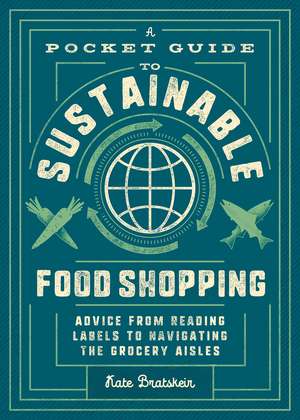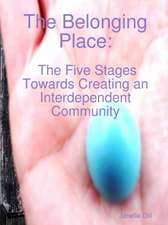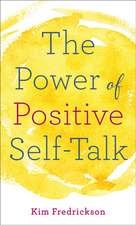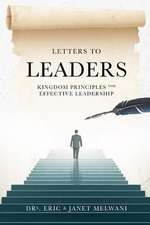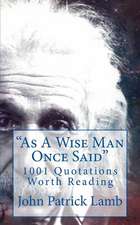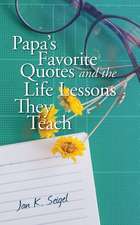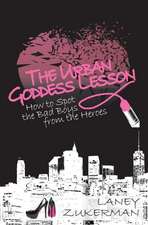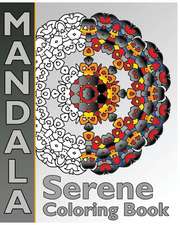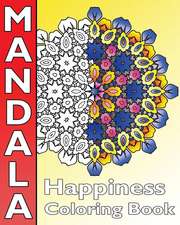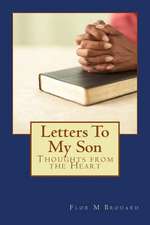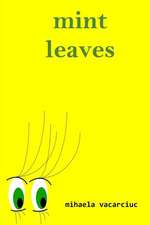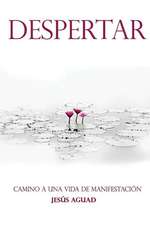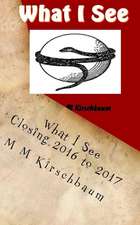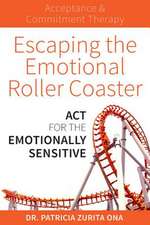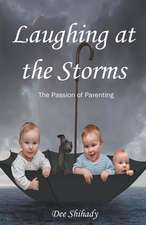A Pocket Guide to Sustainable Food Shopping: How to Navigate the Grocery Store, Read Labels, and Help Save the Planet
Autor Kate Bratskeiren Limba Engleză Paperback – 31 mar 2021
Almond milk, oat milk, rice milk—which of the countless nondairy milks available on the market does the least harm to the environment? How do you decode the language on an egg carton? Is it possible to keep a bundle of fresh asparagus from spoiling so. darn. fast? If plastic is so bad, why is it on everything, and what can you do about it?
These are just some of the questions A Pocket Guide to Sustainable Food Shopping will help answer. Whether you’re someone who’s been making changes for years or you’re clueless about where to start when it comes to sustainability, this book will teach you how to make a difference.
Cutting back on food waste is one of the most impactful ways you can personally help combat climate change. With extra pages for taking notes and a space to perform your own waste audit at home, this book provides the tools to make better choices about what goes into your grocery cart, and how you ultimately treat those items once they’re in your home.
You’ll learn some hard-to-swallow facts about the food industry and gain some actionable tips for making the grocery store—and the world—a more ethical place. You’ll become better at reading food labels, getting acquainted with terms you can trust, and recognizing words and phrases to regard with skepticism. You’ll gain the confidence to shop in the bulk section, ask your butcher questions about sourcing, and perhaps finally relieve some of the guilt you feel over the mountain of plastic bags accumulating beneath your sink.
If you’re ready to make a change, let’s get to it.
Preț: 78.33 lei
Nou
Puncte Express: 117
Preț estimativ în valută:
14.99€ • 15.56$ • 12.50£
14.99€ • 15.56$ • 12.50£
Carte disponibilă
Livrare economică 01-15 martie
Preluare comenzi: 021 569.72.76
Specificații
ISBN-13: 9781982150068
ISBN-10: 1982150068
Pagini: 144
Ilustrații: 1 chart thru-out
Dimensiuni: 127 x 178 x 20 mm
Greutate: 0.16 kg
Editura: S&S/Simon Element
Colecția S&S/Simon Element
ISBN-10: 1982150068
Pagini: 144
Ilustrații: 1 chart thru-out
Dimensiuni: 127 x 178 x 20 mm
Greutate: 0.16 kg
Editura: S&S/Simon Element
Colecția S&S/Simon Element
Notă biografică
Kate Bratskeir is a journalist based in New York City, where she lives with her spouse and dog. She writes about food and health and believes in the right to food access and education for all. Her work has appeared in HuffPost, Health, Fast Company, and more.
Extras
Chapter 1: Environmental Guilt Syndrome1. ENVIRONMENTAL GUILT SYNDROME
Once you begin to notice plastic and other needless waste, you won’t be able to stop noticing. You’ll wonder why that tin of organic nuts you bought had to come with a plastic seal. You’ll roll your eyes at plastic straws, kick yourself for allowing a beautiful bunch of carrots to shrivel, feel physically ill over taking a swig from a plastic water bottle, and question why the hell you have so many Christmas ornaments, anyway.
I’ve spent a lot of time feeling really terrible about every imperfect purchasing decision I’ve made. (Sometimes I can’t bear to tell a cashier I have my own bag when they’ve already expertly packed my stuff.) Anne Marie Bonneau, aka the Zero-Waste Chef, has dubbed this condition Environmental Guilt Syndrome. EGS stems from the desire to be perfect in the decisions you make to cut your plastic consumption and never let a sweet potato sprout eyes and wrinkle again. But “it’s impossible to be perfect,” Bonneau says. “I think if you try to be perfect, you’re just going to be paralyzed, and you might not do anything.”
Bonneau’s EGS is along the same lines as “eco-anxiety,” a condition the American Psychological Association describes as the feelings of helplessness and dread associated with “watching the slow and seemingly irrevocable impacts of climate change unfold, and worrying about the future for oneself, children, and later generations.”1 This is real stuff.
There’s a saying that’s popular in the waste-focused space that might help you shake some guilt: “We don’t need a handful of people doing zero waste perfectly. We need millions of people doing it imperfectly.”
Also: the gargantuan amount of waste our world has produced, collected, and improperly disposed of—none of that is your fault. “Our society is not set up to make it easy to live sustainably,” Bonneau points out. “We’re all swimming upstream.”
But the point is we’re still swimming. More and more people are committing to sustainable practices every day, and for this reason, we can have hope.
I ask you to find solace in the fact that you will never be perfect (in your fight against food waste—or anything, really).
Accepting this imperfection will free you to make progress.
Once you begin to notice plastic and other needless waste, you won’t be able to stop noticing. You’ll wonder why that tin of organic nuts you bought had to come with a plastic seal. You’ll roll your eyes at plastic straws, kick yourself for allowing a beautiful bunch of carrots to shrivel, feel physically ill over taking a swig from a plastic water bottle, and question why the hell you have so many Christmas ornaments, anyway.
I’ve spent a lot of time feeling really terrible about every imperfect purchasing decision I’ve made. (Sometimes I can’t bear to tell a cashier I have my own bag when they’ve already expertly packed my stuff.) Anne Marie Bonneau, aka the Zero-Waste Chef, has dubbed this condition Environmental Guilt Syndrome. EGS stems from the desire to be perfect in the decisions you make to cut your plastic consumption and never let a sweet potato sprout eyes and wrinkle again. But “it’s impossible to be perfect,” Bonneau says. “I think if you try to be perfect, you’re just going to be paralyzed, and you might not do anything.”
Bonneau’s EGS is along the same lines as “eco-anxiety,” a condition the American Psychological Association describes as the feelings of helplessness and dread associated with “watching the slow and seemingly irrevocable impacts of climate change unfold, and worrying about the future for oneself, children, and later generations.”1 This is real stuff.
There’s a saying that’s popular in the waste-focused space that might help you shake some guilt: “We don’t need a handful of people doing zero waste perfectly. We need millions of people doing it imperfectly.”
Also: the gargantuan amount of waste our world has produced, collected, and improperly disposed of—none of that is your fault. “Our society is not set up to make it easy to live sustainably,” Bonneau points out. “We’re all swimming upstream.”
But the point is we’re still swimming. More and more people are committing to sustainable practices every day, and for this reason, we can have hope.
I ask you to find solace in the fact that you will never be perfect (in your fight against food waste—or anything, really).
Accepting this imperfection will free you to make progress.
Descriere
Limit your waste and reduce your carbon footprint with this modern and practical guide to sustainable grocery shopping.
